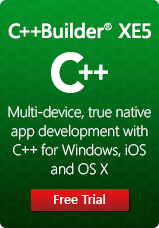Here's a copy of an upcoming C++Builder email. Two things to note here:
1. Some of the December
special offers have been continued into January so you can still upgrade from any earlier version and get some of the bonus items that were available in December. This applies to Delphi, C++Builder and RAD Studio.
2. If you haven't tried the new C++ mobile development capabilities yet,
download a trial of C++Builder XE5 or RAD Studio XE5 and give them a try. If you did a trial earlier when XE5 was first released, you can try it for another 30 days with the new C++ mobile features. This is a special exception to the usual single trial per user.
|
|
|
| | | |
| Try or buy new C++Builder XE5 with iOS today |
|
| | | |
One more chance to get special offers or a free trial
Now, you can visually create iOS apps coded in C++ that compile direct to the CPU, delivering higher performance, security and a better user experience. Your apps can access iOS device APIs, sensors and services. You’ll be amazed at how quickly and easily you can develop mobile apps with C++Builder XE5.
More reasons for Windows developers to upgrade
If you’re still using an older version of C++Builder, here is some of what you get in XE5:
- 64-bit Windows compiler with C++11
- FireDAC data access components
- Windows 8 and touch/gesture support
- VCL and FM custom styles
- REST Client with Visual LiveBindings
Don’t miss this opportunity to add iOS to your app development skill set! |
|
|
|
|
|
|
|
|


4 comments:
Tim, how do iOS C++ applications coded using C++ Builder specifically provide "higher security"?
Native compiled apps are generally more secure than HTML and JavaScript based apps.
Tim, I'm sorry, but you just answered one fact-free claim with another claim. :-( Secure from what? How? Why?
There have been many articles written on topic. For example, see HTML5 hard truth No. 1: Security is a nightmare at http://www.infoworld.com/d/html5/11-hard-truths-about-html5-169665?page=0,0. There are also other factors like native apps going through extra security checks as part of the approval process to be distributed through app stores where web-based apps (those not packaged up as "native" apps) don't.
Post a Comment